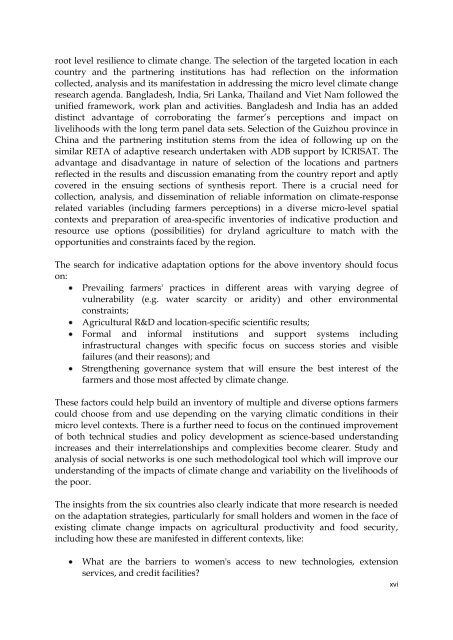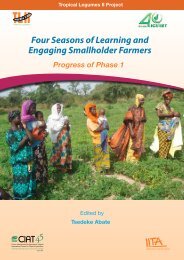Regional synthesis report - icrisat
Regional synthesis report - icrisat
Regional synthesis report - icrisat
Create successful ePaper yourself
Turn your PDF publications into a flip-book with our unique Google optimized e-Paper software.
oot level resilience to climate change. The selection of the targeted location in each<br />
country and the partnering institutions has had reflection on the information<br />
collected, analysis and its manifestation in addressing the micro level climate change<br />
research agenda. Bangladesh, India, Sri Lanka, Thailand and Viet Nam followed the<br />
unified framework, work plan and activities. Bangladesh and India has an added<br />
distinct advantage of corroborating the farmer’s perceptions and impact on<br />
livelihoods with the long term panel data sets. Selection of the Guizhou province in<br />
China and the partnering institution stems from the idea of following up on the<br />
similar RETA of adaptive research undertaken with ADB support by ICRISAT. The<br />
advantage and disadvantage in nature of selection of the locations and partners<br />
reflected in the results and discussion emanating from the country <strong>report</strong> and aptly<br />
covered in the ensuing sections of <strong>synthesis</strong> <strong>report</strong>. There is a crucial need for<br />
collection, analysis, and dissemination of reliable information on climate-response<br />
related variables (including farmers perceptions) in a diverse micro-level spatial<br />
contexts and preparation of area-specific inventories of indicative production and<br />
resource use options (possibilities) for dryland agriculture to match with the<br />
opportunities and constraints faced by the region.<br />
The search for indicative adaptation options for the above inventory should focus<br />
on:<br />
Prevailing farmers' practices in different areas with varying degree of<br />
vulnerability (e.g. water scarcity or aridity) and other environmental<br />
constraints;<br />
Agricultural R&D and location-specific scientific results;<br />
Formal and informal institutions and support systems including<br />
infrastructural changes with specific focus on success stories and visible<br />
failures (and their reasons); and<br />
Strengthening governance system that will ensure the best interest of the<br />
farmers and those most affected by climate change.<br />
These factors could help build an inventory of multiple and diverse options farmers<br />
could choose from and use depending on the varying climatic conditions in their<br />
micro level contexts. There is a further need to focus on the continued improvement<br />
of both technical studies and policy development as science-based understanding<br />
increases and their interrelationships and complexities become clearer. Study and<br />
analysis of social networks is one such methodological tool which will improve our<br />
understanding of the impacts of climate change and variability on the livelihoods of<br />
the poor.<br />
The insights from the six countries also clearly indicate that more research is needed<br />
on the adaptation strategies, particularly for small holders and women in the face of<br />
existing climate change impacts on agricultural productivity and food security,<br />
including how these are manifested in different contexts, like:<br />
What are the barriers to women's access to new technologies, extension<br />
services, and credit facilities?<br />
xvi

















